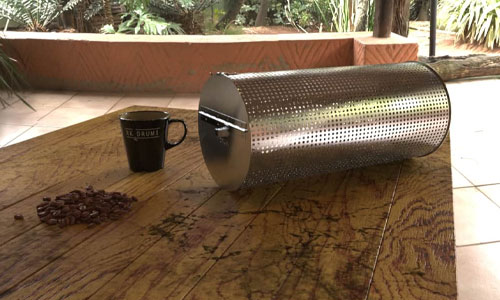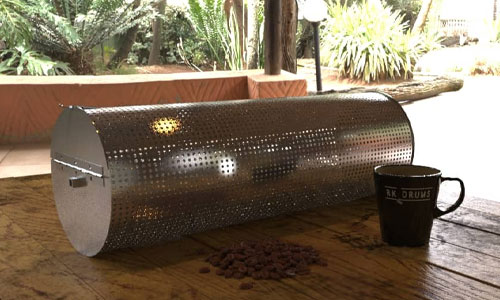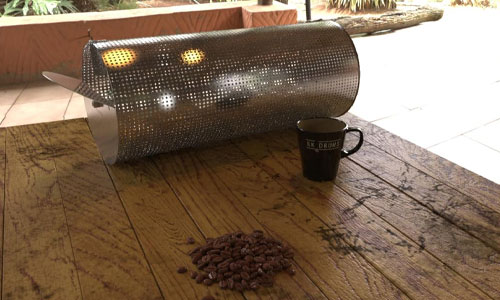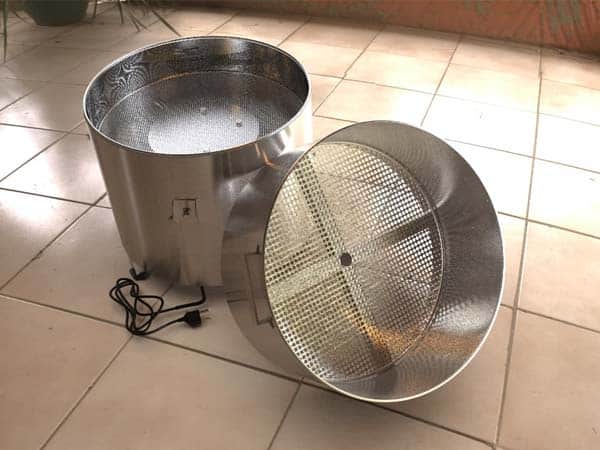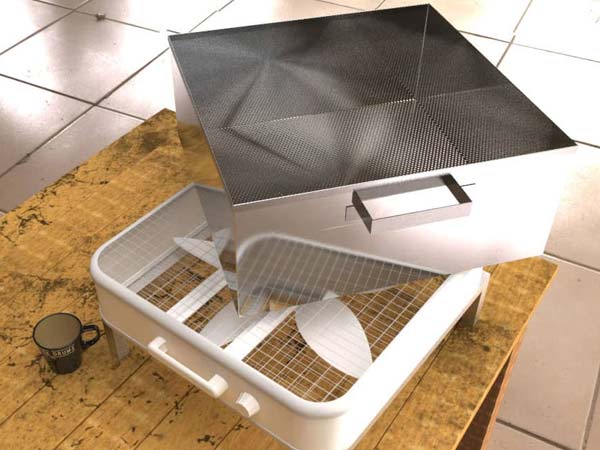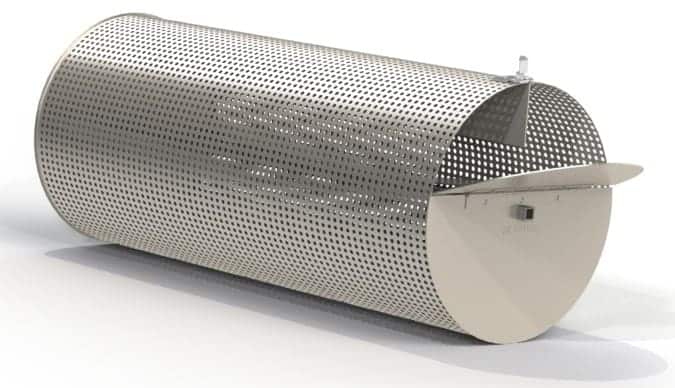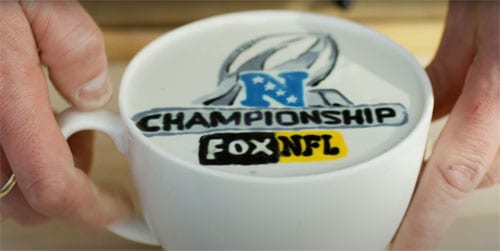
Generate Income by Selling Fresh-Roasted Coffee
In particular, a coffee roastery can be a profitable home business with low start-up costs. If you’re looking to make money from home, here’s why a coffee roastery might be the right type of business for you and how to get one started.
Imagine creating your own coffee brand with a logo and your own name and showing your friends and family your coffee brand sitting on a store shelf.
How Much Coffee Can I Roast in a Week, and How Much Can I Make?
As a general guideline, expect to spend twice as much time roasting and packaging coffee as you do selling your bagged beans. The ratio will vary some depending on how you sell (e.g. via delivery, shipping, direct retail, etc.), but this is a baseline to use as you begin to plan how to make money from home roasting coffee.
With a 6 lb kit, you profit around $5,040 per week after expenses are accounted for. With a 12 lb kit, you could double that at $10,080 per week.
- RK Drums 6-Pound Starting Kit can roast 7.5 lbs per 20 minutes or 22.5 pounds per hour.
- RK Drums 8-Pound Drum can roast 10 lbs per 20 minutes 30 pounds per hour.
- RK Drums 12-Pound Drum can roast 15 lbs per 20 minutes or 45 pounds per hour.
With the 6-Pound Starting Kit, you could roast 180 pounds per day or 720 pounds per week if you run the roaster full-time.
As stated, the ongoing expenses are primarily coffee, packaging supplies, propane and delivery. For green coffee, you should budget between $2 and $5 per pound. RK Drums recommends starting at the lower price point for green coffee, unless your particular market demands labels, such as fair trade or organic. The reason is that even the $2 green coffee will produce an end product that will blow your customers away, and the cheaper price will allow your business to be competitive.
If you’re roasting 720 pounds of coffee per week, you could potentially profit around $7 per pound with a successful setup and sufficient customers.
What Are the Startup Costs of a Home Coffee Roasting Business?
If you’re considering businesses with low startup costs, a home-based coffee roasting business will be among the most affordable businesses to start. Depending on your particular setup, you can begin for as little as $1,500 or less. Here’s a breakdown of the various startup costs that you’ll need to cover.
- Coffee Roaster ($850 to $1600)
- Method to Quickly Cool Roasted Beans ($50 to $800)
- Green (Raw) Coffee Beans (Starting at $250 / 125 lb bag)
- Packaging Supplies - Scale, Large Containers, Bags & Labels, Shipping Supplies
- Propane for the Grill (~$45 for a new Tank, ~$25 to Refill)
- Payment Processing System (You can start with Square for free!)
- Website (Optional)
To roast coffee at commercial volumes on a budget, you’ll need a grill to provide the heat, and a steel drum to rotate the beans above the heat. You can get a gas grill that will do the job for under $200 at your local hardware store, and a kit to convert your grill into a coffee roaster. Our kits start at $650 for a 6 lb drum, $730 for an 8 lb drum and $865 for a 12 lb drum. Cooling the roasted coffee quickly will ensure that you produce a quality product that doesn’t taste burnt. If you’re willing to DIY a cooling solution, some boards and a screen built around a box fan will do the trick for around $50. If you want a more ready-to-go solution, our coolers start at $425. Green coffee can be ordered in bulk bags weighing between 100 and 125 lbs starting around $2.00 per lb. The remaining startup costs, excluding a website, make up the remaining $1500 you need to get started with your new business.
Coffee Roaster Options
You’ll need a method for roasting coffee, which is done via a coffee roaster. While there are various designs, all coffee roasters work on the same basic principles. Green coffee beans are heated to a specific temperature over a specific amount of time, and the roaster hopefully agitates the beans in order to ensure even roasting throughout a batch.
The most common ways to do this are with a personal coffee roaster, a high-end commercial coffee roaster or a grill drum coffee roaster. Of these three options, a grill drum roaster has the highest production volume versus cost, and is the best option if you’re looking at low start-up cost business ideas.
Personal Roasters are Insufficient for Commercial Production
A personal coffee roaster certainly is the cheapest of these three roaster options, and you can even get started with an old air-popper for popcorn, or the artisanal pan roast method that can be accomplished for less than $100. Any type of personal roaster, however, isn’t really suited for commercial production as it doesn’t very roast evenly or in large volumes
First, most personal roasters aren’t built to withstand the level of use that commercial roasting requires. Individuals who use personal roasters might roast one or two batches of coffee a week, and not the multiple batches per day that a commercial roaster must produce.
Second, personal roasters are only able to produce small batches of coffee at a time — many models will roast no more than a ½ pound of beans per batch. When you’re operating at a commercial level, this simply takes too much time and requires too much electricity to produce the amount of coffee that a business needs.
High-end Commercial Roasters Increase Expenses
A high-end commercial roaster is certainly able to meet a roasting business’ needs, but this option has major downsides if you’re considering home business ideas with low startup costs.
High-end commercial roasters cost much more than $1,500, with many models priced in the five-figure range. Additionally, other costs come with high-end commercial roasters. If you invest in this level of equipment, you’ll also need to run a gas line for the roaster, procure insurance for it and have enough coffee to fill the roaster for each batch. These expenses are hardly consistent with a low-cost at-home business plan.
Grill Drum Roasters are Capable and Affordable
A grill drum roaster offers a well-designed combination of capability and affordability by building a classic roaster into a standard grill. The drum style of coffee roaster is widely used at all levels of roasting, from home roasting to large-scale commercial production, because drums provide effective agitation. With this type of roaster, the coffee beans are placed into a drum that slowly rotates throughout the roasting process so that the beans are evenly heated.
A grill-based drum roaster lets home-based commercial coffee roasters roast at a suitable scale without investing in expensive equipment. The grill drum roasters that RK Drums carries range in capacity from 2 pounds to 12 pounds per batch, and they’re priced between $370 and $1,414 for a complete kit. For commercial operations, we recommend the 6 pound capacity as a minimum. This permits up to 45 lbs an hour on the large kits, which is comparable to the larger commercial roasters. Note that custom sizes are also available, if you require more capacity.
The grill drum roasters that RK DRUMS carries allows you to roast large volumes, up to 45 lbs for less than $1,500.
Method to Quickly Cool Roasted Beans
Once coffee beans are brought to the desired roast level, they should be cooled as quickly as possible in order to stop the roasting process. Preferably, the beans should be cooled within 2-3 minutes for best results.
- RK Model T Coolers off the fastest cooling but also cost the most and are limited to 8 lbs. This option is the cleanest, in that it collects chaff.
- RK Model F Coolers use a common household box fan for quick cooling at a more affordable price, with capacities up to 15 lbs.
- DIY box fan coolers cool fairly effectively and can be made inexpensively if you do the work.
Note: For best results beans should be cooled within 2-3 minutes.
This is one place where you can keep startup costs low by beginning with a do-it-yourself solution and upgrade as your home business generates revenue.
Green Coffee Beans
When purchasing coffee at scale, you should expect to pay $3 or less per pound. For specialty coffees, including organic or fair-trade, etc…, you could pay $5 or more per pound. Do note that coffee sells at market price, much like gasoline, so pricing will vary at time of purchase. Even when you’re just starting to work from home as coffee roaster, you can still purchase a full bag of green coffee because they’ll generally last up to 2 years if stored in a cool, dry place.
Packaging Supplies
Once coffee is roasted, it must be packaged for wholesale or retail. To do this, you’ll need:
- Scale (should be able to measure ounces to 10 pounds accurately)
- Containers for sorting coffee (5 gallon food-grade buckets work well)
- Bags and labels (packplus.com and richmarklabel.com are good sources)
- Shipping supplies and/or a vehicle for delivery
Ongoing Expenses
After everything is set up, your home business will continue to incur a few ongoing expenses. These include the purchase of additional coffee and bags, as well as:
- Propane for the grill
- Payment processing system
- Shipping or delivering expenses
- Website expenses (if selling online)
Ideas to Get Started and Promote the Business?
The good news when you’re starting a coffee roasting business is that you will have an excellent product. After some practice roasting, even a novice roaster’s coffee will far exceed the taste of most store-bought brands. This is because coffee is an agricultural product, and it naturally loses flavor and freshness over time like any other produce product would.
Large roasting companies can’t roast and distribute their coffee as quickly as you can. As a result, if you can deliver your coffee within 96 hours to the customers, you will always beat the competition.
If you get coffee into customer’s hands between 48 and 96 hours after roasting, you’ll have one of the best roasted coffees in town. Even if you get roasted beans to customers within two weeks, you’ll far outdo all large-scale commercial roasters that take longer (often months!) to get roasted coffee into customers’ hands.
As for where to take your roasted coffee samples for people to try, there are many potential places. You can reach individual customers who might purchase a bag or two at:
Festivals, fairs and shows can give you exposure to large numbers of people, while farmers’ markets offer a more consistent opportunity to reach smaller numbers of locals. Additionally, any roadside location may be convenient for your business and for customers.
- Festivals, fairs and shows

In some localities, single-room, roadside booths or shacks are permitted. These make convenient drive-by locations if they have a substantial amount of regular traffic passing by.
- Mom & Pop Grocery stores (that carry your coffee)
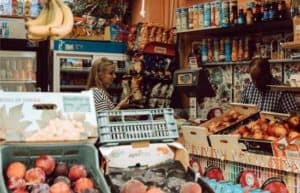
- Farmers’ markets and Flea markets

- Coffee shops and cafes
- Restaurants and food trucks
- Independent gas stations
- Churches
Online sales are an obvious potential market as well, but sampling to virtual customers is often a challenge. One way to address this obstacle is to send samples to influential bloggers and influencers who can recommend your product to their followers. Also, you can offer small sample sizes that people can try before purchasing a full 12-ounce bag of coffee.
Another challenge with online sales is shipping, for shipping 12-ounce bags of coffee isn’t inexpensive. To mitigate shipping costs as much as possible, set up an commercial account with USPS. The account will provide you with access to free boxes, and you can send 5 to 15 pounds at various “regional rate” or “flat rate” prices.
To pass these costs onto the customer, you can either charge a single fee for shipping or offer free shipping when customers purchase a certain amount of coffee.
What You Will Do Throughout the Week to Maintain Your Coffee-Roasting Business
- Roasting coffee
- Packaging coffee
- Shipping coffee
- Delivering coffee
- Contacting customers
As you plan out your week’s activities, remember that you can package roasted coffee while roasting other batches, and all roasted coffee should be sent to customers as promptly as possible. With these principles in mind, here’s a sample schedule you could follow:
- Monday: Make cold calls for commercial accounts and accept orders
- Tuesday: Take the day off aside from accepting orders
- Wednesday: Roast and package coffee, and ship orders
- Thursday: Deliver coffee in person
- Friday: Deliver coffee and contact customers
- Saturday: Sample and sell coffee at retail locations
- Sunday: Sample and sell coffee at retail locations
If your business grows, Tuesday can also become a roasting day. Once you’re roasting all Tuesday and Wednesday, you should have enough revenue to hire someone to help you with delivery, sampling and sales. You can also hire someone to take over packaging as your revenue increases.
Benefits of a Coffee Roasting Business
1. Recession Proof
First, coffee roasters are fairly recession-proof businesses. People typically still spend money on small, affordable luxuries — like chocolate, movies and coffee — even during periods of recession. After all, many people will still need to drink coffee.
2. Weekly or Monthly Purchases
3. Unlimited Customers
4. Low Competition for Truly Fresh Coffee
5. Be Your Own Boss
Fifth, this (like many home business ideas) truly lets you be your own boss. You can follow the example schedule noted above, or you can adjust your schedule as needed. Many of the activities even can be altered on a weekly basis if you have an ever-changing personal schedule.
6. Easy to Learn, You Can Start This Very Weekend
Sixth, coffee roasting might sound complex but it’s easy to get started in. You can achieve excellent results with the right equipment and minimal guidance, and the team at RK Drums is always willing to help new roasters learn the industry.
We specialize in helping new roasters get started, and our equipment is uniquely suited to making high-quality roasted coffee with an affordable home-based business setup.
There is no specific experience, knowledge or network that’s needed to get started as a coffee roaster. You’ll learn as you go along, but you can get started today and soon have a profitable home business.
Benefits of Choosing RK Drums for Your Coffee Roasting Business
If you’re new to coffee roasting, that’s completely fine. We’ll walk with you through the roasting process over the phone, coaching you on how to develop great roast profiles for the coffee you have. We’ll gladly pass on our expertise through personalized guidance from the team at RK Drums.

